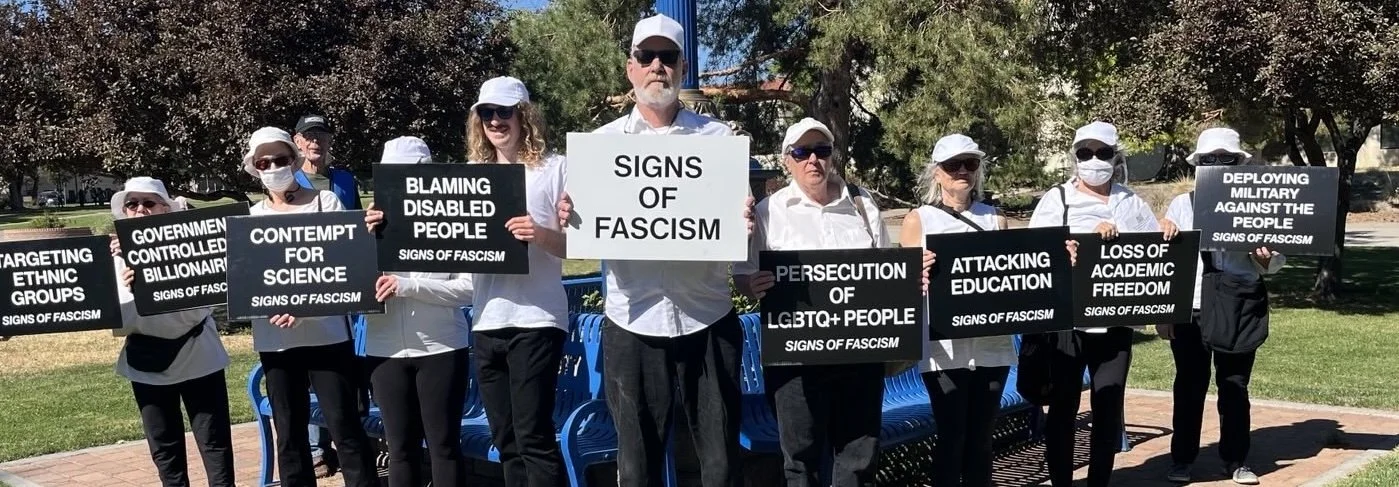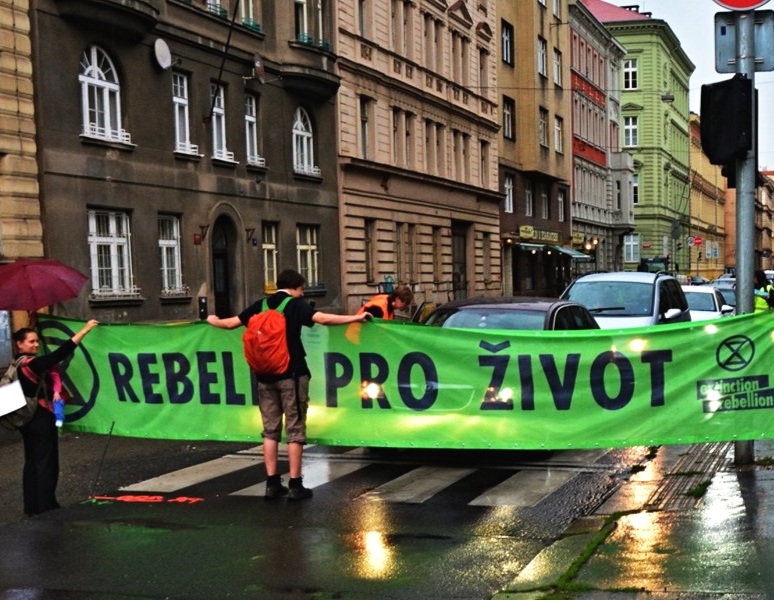Why aren't the kids protesting fascism?
/Despite the parched season of early fall, my university campus is a peaceful landscape of intersecting concrete paths, heavily watered lawns, and juicy deciduous trees nearly hiding the facades of randomly designed college buildings—ranging from the traditional admin building that’s nearly a hundred years old to the self-consciously-modern art building. Above all this rise yellowish brown hills, the real world of drought and fire danger beyond the lush campus.
I walk at the end of a line of people holding signs. Each one bears the sub-title “Signs of Fascism” and a single symptom of the national disease—banned books, detention camps, intimidation of journalists, firing truth tellers, coerced loyalty, military deployed against the people, etc. Mine says “Government controlled by billionaires.” I’m last, not by plan but because I had to stop to talk to the campus security chief.
But I think my sign belongs either first or last. It’s the root, after all. Not just a sign but the ultimate cause, the reason that goes beyond any particular party or tyrant or social ill of the moment. I became aware of how our system is rigged to legalize bribery and hand the keys to the nation to the top one or two percent of wealth as a freshman undergraduate.
That was more than 30 years ago. I’ve been crying it from the rooftops in one way or another ever since. Not that it’s done any good.
Students wander past us, drifting between classes, mostly alone walking while looking at their phones, occasionally in small groups of two or three, talking loudly about “the game” or where to meet tonight. Mostly they won’t even look at our signs. Some peer cautiously, and then catching the drift, their eyes jerk down and away as if burned.
Maybe if they look away, the whole thing will disappear.
A few of us try to hand out fliers. I wave them at students who veer near me and speak to them only if I sense a bit of openness in their body language, a pause in their stride, a face turned toward me. A few take a leaflet and mutter, “Thank you.” Head down, hurrying on.
As we are heading back to the secluded corner where we started, I notice a somewhat larger group off to the side—four students together. They all seem to be looking vaguely toward us and even I can see that only one of them is white. The other three are various shades of brown. I don’t want to be pushy, especially not these days. They say the international students (most of the people of color in town are international students) are terrified, afraid to leave the campus even to get groceries. They might somewhat support our cause of crying out against the destruction of our democracy, but they have to protect themselves and being associated with us is unlikely to help.
But as our line passes near them, these four are still turned toward us, tentative in their stances, but not turning away. So, I take a few bold steps out of line. “Want a flier?”
The black guy, the largest of the group, takes one step toward me and reaches out a hand. “Thanks!”
I ensure he gets several to share as he makes a quick grab, and I’m encouraged by the genuine appreciation in his voice.
I’m a student again after all these years, but I’m clearly not like them. I’m not their age and I might as well have not been like them even when I was. I remember being a kid on a campus like this in my early twenties. No one wanted to hear it when I talked about the dangers to democracy, the drive toward militarism, Christian nationalism, the rhetoric of the far right against the poor, the disabled, minorities and immigrants, and so forth. It’s been the same all these decades. So, it’s no wonder young people are discouraged and checked out.
Still, I do have a sixteen-year-old daughter, a girl enjoying high school friends and obsessed with clothes and makeup. She’s rarely interested in politics of any kind and I don’t push her. She knows I go out to protest, and the best of my relationship with her dad consists of animated diatribes on the political situation on both sides of the north Atlantic. “Trump’s at it again! Unbelievable.” “Putin’s taken another step closer to World War Three.”
But today, she wants to talk while she puts her makeup on and to tell me about what she’s learned on the internet. It’s all about Charlie Kirk and “the greatest tragedy in history.” I nod along and make sympathetic noises as she describes his three-year-old daughter rushing toward the stage to get to her daddy when Kirk was shot. It’s a terrible image. No wonder my daughter is deeply affected.
She tells me how Kirk’s wife, Erika Kirk, “should be a saint because she forgives the bad people who killed him, even though they hate America and hate God.” I am starting to get concerned. Wait a minute! This is Erika Kirk, who is taking over the white supremacist TurningPointUSA organization. And it’s my brown, foreign born daughter saying it.
I take a breath and remember to ask questions, to help her think things through rather than forcing “facts” on her. “Are you sure. How do you know that’s true?” I ask.
“It is true. Trump even said that he would never forgive his enemies, that he hates people who are against him and wants them dead. He said he’s not as good and pure as Erika. That’s how you know it’s true.”
This little speech is more than my daughter has ever said about politics. Ever. And I’m now deeply concerned. She’s basing her idea of what is “true” on the fact that Trump says he doesn’t forgive people but Erika does.
I continue to try to talk it through with her. The fact that Trump hates his enemies proves nothing about Erika Kirk. I talk to my daughter about the racist ideology Charlie Kirk espoused and the actions of Turning Point members, attacking people like her—for not being white and for being born in another country. I send her videos of Kirk’s racist statements about women of color lacking the “brain processing power” to be successful in professional careers or academics, which he said proved they were taking opportunities “from a white person.” I send her videos showing how Trump directly lies and contradicts himself.
She says, none of that really matters. The only thing she needs to know is that “Charlie Kirk was a man of God and a good person.” I don’t argue with her on that. I don’t know Charlie Kirk’s relationship with God and I’m not in the business of saying who’s a good person or not. I’m only trying to help my kid differentiate reality from illusion.
She never watches the videos I send. She won’t even look. A few days later, I look up articles about the assassination. It turns out Charlie Kirk’s three-year-old, his other child and his wife were not present when he was shot. The little girl did not run to him after the single shot was fired. People started saying it after watching a video of the child running to him on a different stage, indoors, at a completely different event.
But my daughter has been brainwashed by the emotional, illusory image of that child running to him in the outdoor crowd amid a hail of bullets.
And this I realize is not just happening to my teenager. This is what is happening to young people across the whole country, on our local college campus and around the world. Their entire understanding of the world is being formed by influencer videos, Trump speeches and counter-factual social media memes.
There are exceptions of course. Social media will send you down whichever rabbit hole you happen to show interest in. There are healthier paths that some stumble upon. There are even extreme left-wing delusions out there, though the right-wing manipulation complex is vastly larger and more pushy online.
But this does explain to me why the majority of those protesting the rise of fascism in the United States are people over forty, many actually over sixty. We aren’t really any better at differentiating fact from fantasy or navigating the online world. But maybe we are online less in general and we take our information from established media and long-trusted sources, which—while not perfect—are less likely to support completely fabricated “alternative facts.”
More importantly, our first impressions of the world were not formed in this virtual reality saturated with propaganda. The fact that today’s young people are steeped in that easily manipulated online world is one of the most terrifying things I’ve seen in the past year. And that, as you know, is a high bar.





















